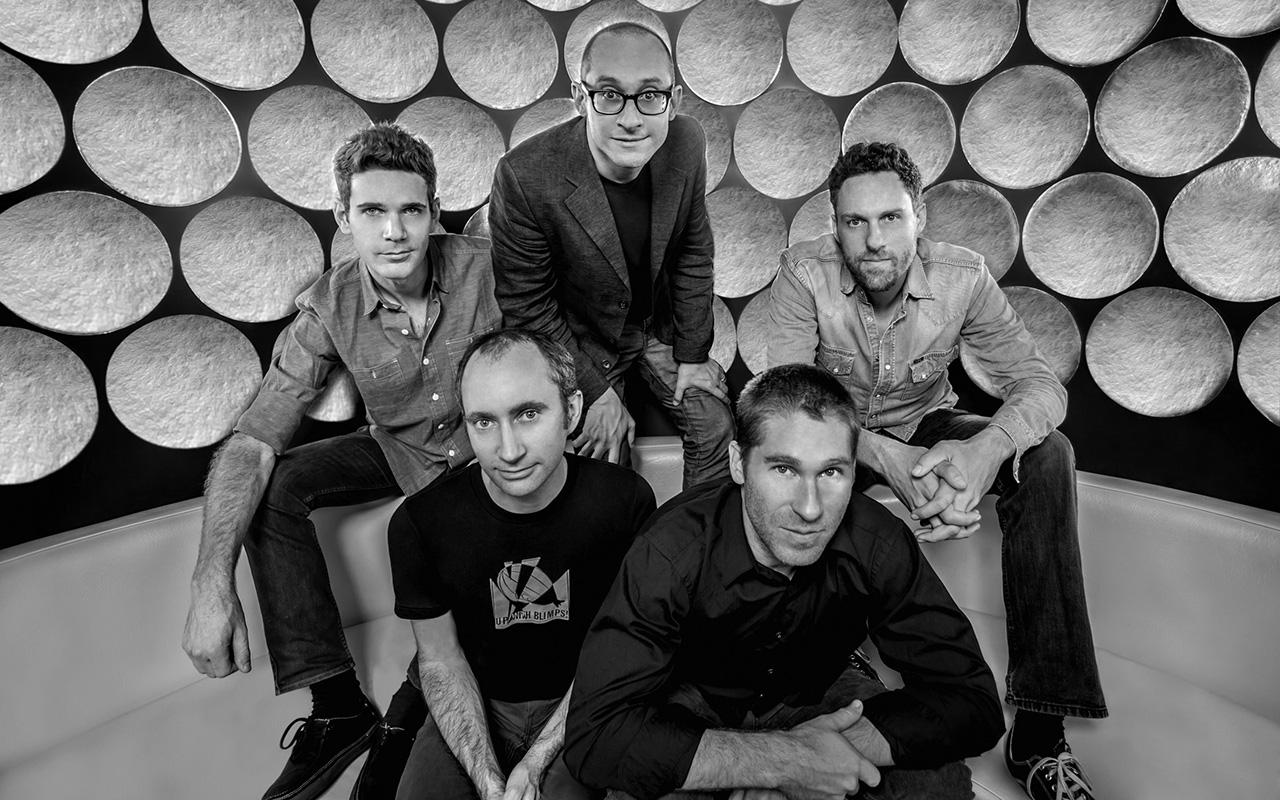
Kneebody photo by Paulifornia
Tractor Tavern
Tuesday, April 8
The impact of quintet Kneebody derives from its ignoring genre divisions and embracing an array of musical styles of the last 50 years or so, but also elevating the amalgam to something more than its parts.
Get wrong that part of attempts to triumph over influences, and the result can be a pastiche as unappetizing as a dog’s uneaten dinner. Get it right, by whatever means, and you’ve set yourselves apart. You’ve dispelled doubt in an anxious era of post-just-about-everything, arguably jazz included. At the same time, you’ve opened avenues for jazz’s way forward.
Kneebody is a leaderless combo with keyboardist Adam Benjamin, trumpeter Shane Endsley, electric bassist Kaveh Rastegar, saxophonist Ben Wendel, and drummer Nate Wood. Part of the band’s appeal derives from each member’s high level of instrumental and compositional accomplishment; part comes from their collective unity of purpose and the members’ extensive awareness of each other’s capabilities. That is hardly surprising, given that the five startling individualists have been playing together since their late teens while at the Eastman School of Music and Cal Arts. From there they pooled their musical resources to jump into the Los Angeles music scene of the early 2000s, and soon launched Kneebody’s sound worldwide.
Also compelling is their agreement that any member can cue changes in tempo, key, style, and other features of the music – a mode of operation that you can’t call a shtick, because it sticks.
What substantiates that, and distinguishes this band from so many of the others that can lay claim to creating their own mash up and recombination of styles and genre gestures? Again, it’s all in the sticking it. No end of tuned-eared jazz observers give Kneebody credit for doing that. It is a “resolutely un-pindownable band,” Nate Chinen wrote in the New York Times.
He’s right. You can identify several strains that Kneebody has trapped and brewed: urban genres like electro-pop, punk-rock, and hip-hop; jazz that is recognizably jazz; and a signature Kneebody tight bonding of whatever goes into the mix.
That mix, by the way, produces a distinctive drive and tightness, but there really is nothing in Kneebody that should scare off any listener. Its members – all with the band since its early 2000’s inception – describe their sound as explosive rock energy ramped up with nuanced chamber ensemble playing. The quintet seeks to merge wrought compositions with no-holds-barred improvising.
Band members speak of expanding expectations of what goes by the name of jazz – something akin to an elusive quality that seems the catalyst for popularity around New York and the festivals circuit. But, as numerous critics and fans have agreed, with Kneebody you can cast aside “sounds-like” comparisons and start fossicking around for terms to describe the band’s idiosyncrasy and flair.
Hardcoretet is Art Brown (alto sax), Aaron Otheim (keys), Tim Carey (bass), and Tarik Abouzied (drums). Like Kneebody, the Seattle quartet resorts, as all bands seeking promotion must, to fashioning a description that includes identifiable terms. Hardcoretet has that, but it also pulls off the crucial next step: It creates something distinctively more than a pastiche of the parts.
The instrumental quartet speaks of performing original material drawing from jazz, rock, soul, and improvised music, among other styles. Its members can rightly boast of performing music reminiscent of fusion groups like Return to Forever and Herbie Hancock’s Headhunters, as well as more current modern jazz groups like Chris Potter’s Underground and Dave Douglas’ Keystone.
Hardcoretet’s four members certainly have been blooded both on the Seattle scene, as well as in support of such acts as Skerik, Cuong Vu, Mike Stern, Charlie Hunter, Marco Benevento, Bobby Previte, and Bill Frisell. They have appeared at the Earshot Jazz Festival and made tours along the West Coast and throughout the Pacific Northwest. Their first two albums were well received, and with this appearance they launch their third, named for the band. On stage, they execute their solid compositions with an appealing balance of forward drive and exploratory meandering.
In The Stranger, Chris DeLaurenti summed the band up well: “Hardcoretet serve up trenchant, funk-filled improvisations that update the wide-ranging sound of Return to Forever without getting abstruse or bloated.”
In these pages, Nathan Bluford wrote of Hardcoretet’s “funky, driving tunes that are intensely precise and warm with electricity.”
We’re too polite for cutting contests in our gentle town, but here’s an evening that seems certain to deliver a one-two jolt.